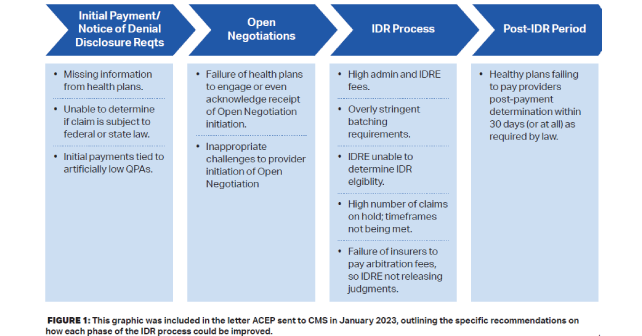
August 2022
When the Departments published the Final Reg, they retracted the rebuttable presumption in favor of the QPA but replaced the presumption with provisions that still tilted the arbitration process in its favor. The TMA again filed suit (TMA II), and again ACEP made the decision to support the TMA case by filing an amicus brief supporting its claims.
Explore This Issue
ACEP Now: Vol 42 – No 06 – June 2023January 2023
ACEP sent a letter to CMS outlining our concerns with the implementation of the No Surprises Act. We provided specific recommendations on how each phase of the dispute resolution process can be improved. We pointed out that there are issues at every step along the way, from the time physicians receive the initial payment or notice of denial for an out-of-network service, to the Open Negotiations and IDR processes, and ultimately to the post-IDR period.
February 2023
In a big win for ACEP and all emergency physicians, the same federal judge in Texas who ruled in the first TMA lawsuit, Judge Jeremy Kernodle, ruled in favor of the TMA again. The Court’s ruling vacated the sections of the August 2022 Final Reg that require the independent arbiters to consider the QPA first in the IDR process and only to consider other factors in so much as they believe those factors are not already represented in the QPA. Again, the ruling applies to the entire federal IDR process nationwide.
In its opinion, the Court mentioned ACEP’s amicus brief, along with briefs filed by other medical societies. Among other important points regarding the illegality of the Reg’s application, ACEP’s brief emphasized that our members would suffer financial harm because the Reg creates an arbitration process that systematically reduces payments to out-of-network physicians. Judge Kernodle’s opinion stated that “the Final Rule nevertheless continues to place a thumb on the scale for the QPA by requiring arbitrators to begin with the QPA and then imposing restrictions on the non-QPA factors that appear nowhere in the statute.”
Judge Kernodle then rejected the Government’s request that the decision be limited to only the Plaintiffs in the case, holding that vacatur is not unduly disruptive and that the decision must be enforced globally. Arbitrators will continue to decide disputes using all statutory factors as clearly set forth in the Act. He stated, “And here, vacatur would preserve the status quo because arbitrators have been—and are presently—deciding payment disputes pursuant to the statute since the Court vacated the interim final rule nearly a year ago.”
Pages: 1 2 3 | Single Page




No Responses to “The Surprise Billing Fight Continues”